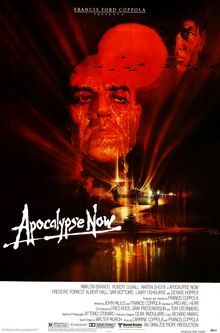Benjamin L. Willard
| Apocalypse Now | |
|---|---|

Theatrical release poster by Bob Peak
|
|
| Directed by | Francis Coppola |
| Produced by | Francis Coppola |
| Written by |
|
| Starring | |
| Music by |
|
| Cinematography | Vittorio Storaro |
| Edited by | |
|
Production
company |
|
| Distributed by | United Artists |
|
Release date
|
|
|
Running time
|
153 minutes |
| Country | United States |
| Language | English |
| Budget | $31.5 million |
| Box office | $150 million |
Apocalypse Now is a 1979 American epic war film directed, produced and co-written by Francis Ford Coppola and co-written by John Milius with narration by Michael Herr. It stars Marlon Brando, Robert Duvall, Martin Sheen, Frederic Forrest, Albert Hall, Sam Bottoms, Larry Fishburne, and Dennis Hopper. The screenplay written by Milius updates the setting of Joseph Conrad's novella Heart of Darkness to that of the Vietnam War. It draws from Herr's Dispatches, and Werner Herzog's Aguirre, the Wrath of God (1972). The film revolves around Captain Benjamin L. Willard (Sheen) on a secret mission to assassinate Colonel Kurtz, a renegade who is presumed insane.
The film has been noted for the problems encountered while making it, chronicled in the documentary Hearts of Darkness: A Filmmaker's Apocalypse (1991). These problems included Brando arriving on the set overweight and completely unprepared, expensive sets being destroyed by severe weather, and its lead actor (Sheen) having a breakdown, and suffering a near-fatal heart attack, while on location. Problems continued after production as the release was postponed several times while Coppola edited thousands of feet of film.
Apocalypse Now was released to universal acclaim. It was honored with the Palme d'Or at Cannes, nominated for the Academy Award for Best Picture, and the Golden Globe Award for Best Motion Picture – Drama. It is considered to be one of the greatest films ever made. The film was ranked No. 14 in the British Film Institute's Sight and Sound greatest films poll in 2012. In 2000, the film was selected for preservation in the National Film Registry by the Library of Congress as being "culturally, historically or aesthetically significant".
...
Wikipedia
